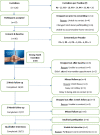"Strong Teeth": an early-phase study to assess the feasibility of an oral health intervention delivered by dental teams to parents of young children
- PMID: 34001087
- PMCID: PMC8130402
- DOI: 10.1186/s12903-021-01608-x
"Strong Teeth": an early-phase study to assess the feasibility of an oral health intervention delivered by dental teams to parents of young children
Abstract
Background: Tooth decay (caries) is a significant health burden in young children. There is strong evidence for the benefits of establishing appropriate home-based oral health behaviours in early childhood. Dental teams are well placed to provide this information and there is clear advice on what oral health information should be given to parents. However, research has shown that there is limited guidance, training and resources on how dental teams should deliver this advice. "Strong Teeth" is a complex oral health intervention, using evidence-based resources and training underpinned by behaviour change psychology, to support behaviour change conversations in dental practice. This early phase evaluation aims to assess the feasibility of this intervention, prior to a full-scale trial.
Methods: The study recruited 15 parents of children aged 0-2-years-old and 21 parents of children aged 3-5 years old, from five NHS dental practices across West Yorkshire. Participant demographics, self-reported brushing behaviours, dietary habits, a dental examination and three objective measures of toothbrushing were collected in a home-setting at baseline, then at 2-weeks and 2-months post-intervention. Recruitment, retention and intervention delivery were analysed as key process outcomes. Brushing habits were compared to national toothbrushing guidelines - the Delivering Better Oral Health toolkit (Public Health England).
Results: Strong Teeth was feasible to deliver in a General Dental Practice setting in 94% of cases. Feasibility of recruitment (37%) exceeded progression criterion, however retention of participants (75%) was below the progression criterion for the 0-2 age group. More than half of children recruited aged 3-5-years had caries experience (52%). Total compliance to toothbrushing guidance at baseline was low (28%) and increased after the intervention (52%), an improvement that was statistically significant. Dietary habits remained largely unchanged. Plaque scores significantly decreased in the 3-5-year-olds and toothbrushing duration increased in all age groups.
Conclusion: "Strong Teeth" intervention delivery and data collection in the home setting was feasible. There was a positive indication of impact on reported toothbrushing behaviours. Some amendments to study design, particularly relating to the inclusion of the 0-2-year-old group, should be considered before progression to a full trial. Trial registration ISRCTN Register: ISRCTN10709150. Registered retrospectively 24/7/2019.
Keywords: Behaviour change; Caries; Paediatric; Parents; Prevention; Training.
Conflict of interest statement
The authors declare no competing interests. PD and KGB have received modest fees to speak about "Strong Teeth" at professional conferences.
Figures



Similar articles
-
HABIT: Health visitors delivering Advice in Britain on Infant Toothbrushing - an early-phase feasibility study of a complex oral health intervention.BMJ Open. 2022 Oct 10;12(10):e059665. doi: 10.1136/bmjopen-2021-059665. BMJ Open. 2022. PMID: 36216423 Free PMC article.
-
"Strong Teeth": the acceptability of an early-phase feasibility trial of an oral health intervention delivered by dental teams to parents of young children.BMC Oral Health. 2021 Mar 20;21(1):138. doi: 10.1186/s12903-021-01444-z. BMC Oral Health. 2021. PMID: 33743641 Free PMC article.
-
"Strong Teeth"-a study protocol for an early-phase feasibility trial of a complex oral health intervention delivered by dental teams to parents of young children.Pilot Feasibility Stud. 2019 Aug 13;5:100. doi: 10.1186/s40814-019-0483-9. eCollection 2019. Pilot Feasibility Stud. 2019. PMID: 31413863 Free PMC article.
-
Home-based toothbrushing interventions for parents of young children to reduce dental caries: A systematic review.Int J Paediatr Dent. 2021 Jan;31(1):37-79. doi: 10.1111/ipd.12658. Epub 2020 May 13. Int J Paediatr Dent. 2021. PMID: 32333706
-
Health visiting teams and children's oral health: a scoping review.BMC Oral Health. 2022 Dec 10;22(1):594. doi: 10.1186/s12903-022-02611-6. BMC Oral Health. 2022. PMID: 36496377 Free PMC article.
Cited by
-
Caries Level in 3-Year-Olds in Germany: National Caries Trends and Gaps in Primary Dental Care.Children (Basel). 2024 Nov 26;11(12):1426. doi: 10.3390/children11121426. Children (Basel). 2024. PMID: 39767855 Free PMC article.
-
HABIT: Health visitors delivering Advice in Britain on Infant Toothbrushing - an early-phase feasibility study of a complex oral health intervention.BMJ Open. 2022 Oct 10;12(10):e059665. doi: 10.1136/bmjopen-2021-059665. BMJ Open. 2022. PMID: 36216423 Free PMC article.
-
"Strong Teeth": the acceptability of an early-phase feasibility trial of an oral health intervention delivered by dental teams to parents of young children.BMC Oral Health. 2021 Mar 20;21(1):138. doi: 10.1186/s12903-021-01444-z. BMC Oral Health. 2021. PMID: 33743641 Free PMC article.
-
Classification of the Type of Contact Between Primary Molars as an Indicator of the Likelihood of Future Caries.Children (Basel). 2025 Jan 29;12(2):161. doi: 10.3390/children12020161. Children (Basel). 2025. PMID: 40003263 Free PMC article.
-
Feasibility and acceptability of home delivery of water for dental caries control in Latinx children-"Sediento por una Sonrisa," Thirsty for a Smile: Single-arm feasibility study.Front Public Health. 2022 Sep 20;10:916260. doi: 10.3389/fpubh.2022.916260. eCollection 2022. Front Public Health. 2022. PMID: 36203695 Free PMC article.
References
-
- World Health Organisation. Ending Childhood Dental Caries – WHO Implementation Manual. Geneva, Switzerland: World Health Organisation; 2020. Available from: https://apps.who.int/iris/handle/10665/330643?show=full
-
- Public Health England National Dental Epidemiology Programme for England: oral health survey of 5-year-olds 2019. London: Department of Health Publications; 2020.
-
- Office of National Statistics—Ministry of Housing, Communities and Local Government. The English Indicies of Deprivation 2019. https://assets.publishing.service.gov.uk/government/uploads/system/uploa...
Publication types
MeSH terms
Associated data
LinkOut - more resources
Full Text Sources
Other Literature Sources
Medical

